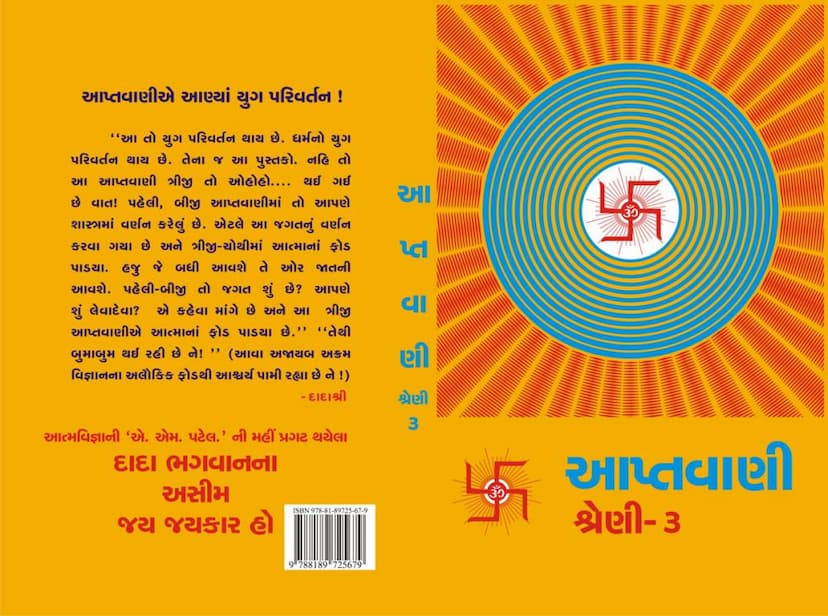Aptavani 03
Added to library: September 1, 2025

Summary
This is a comprehensive summary of "Aptavani 03" by Dada Bhagwan, based on the provided text, which appears to be an index and excerpt of the book. The summary focuses on the core themes and teachings presented.
Aptavani 03: A Summary of Dada Bhagwan's Teachings on Self-Knowledge and Ideal Conduct
"Aptavani 03" is a pivotal work in the teachings of Dada Bhagwan, a spiritual leader renowned for his system of "Akram Vignan" (Unconditional Science). This volume, following the foundational "Aptavani 01" and "Aptavani 02" which laid out the understanding of the external world, delves deeply into the nature of the soul (Atma) and the principles of ideal conduct (vyavahar). The book is presented as a catalyst for "Yug Parivartan" (epochal change), aiming to shift understanding from worldly matters to the profound exploration of the self.
Core Themes:
-
Self-Knowledge (Atma Vigyan):
- The Nature of the Soul: The text extensively explores the soul's true nature as distinct from the physical body and its constituents (pudgal, atoms). It describes the soul as pure consciousness, self-illuminating, ever-present, and untouched by the modifications of matter. Key attributes discussed include knowledge (Gnan), vision (Darshan), infinite power, bliss (Paramanand), formlessness, immutability, and its inherent state of purity and non-attachment.
- Distinguishing Soul from Non-Soul: A central focus is the accurate distinction between the soul (Atma) and non-soul (Anatma), encompassing the physical body, mind, intellect, ego, and emotions like anger, pride, deceit, and greed. These are identified as temporary, material phenomena (pudgal) that are subject to change, whereas the soul remains eternally pure.
- The Path to Self-Realization: The teachings emphasize that true self-knowledge and the experience of the soul are not attained through intellectual study or scriptural knowledge alone, but through the grace of a Living Gnani (the Enlightened One). The Gnani facilitates the direct experience of the Self, transforming one's vision (drishti) from the external world to the inner reality.
- Beyond Mechanical Rituals: The book contrasts superficial religious practices (like mantra chanting, penance, meditation for worldly benefits) with the direct, experiential knowledge of the Self. True spiritual progress lies in realizing one's pure soul nature, not in performing external rituals without inner understanding.
- The Akram Path: The "Akram Vignan" approach is highlighted as a scientific and direct path to self-realization, claiming that through the Gnani's grace, the soul can be experienced in as little as an hour, a feat that would take millions of lifetimes through gradual (kramik) paths.
-
Ideal Conduct (Vyavahar Gyan):
- Harmony in Relationships: A significant portion of the text addresses how to navigate worldly interactions and relationships harmoniously. It stresses the importance of "adjustment" and "samabhav" (equanimity) in all dealings, whether with family, friends, or colleagues.
- Understanding and Acceptance: The teachings encourage understanding the nature of others and adjusting one's own behavior accordingly, rather than trying to change them. It highlights that each individual operates according to their own nature and "vyavasthit" (scientific circumstantial evidence), and imposing one's views leads to conflict.
- The Art of Living: Dada Bhagwan provides practical guidance on living a life free from unnecessary conflicts and distress. This includes managing expectations, practicing non-interference in others' affairs, and maintaining inner peace amidst external circumstances.
- The Significance of Forgiveness and Pratikraman: The text emphasizes the power of forgiveness and "pratikraman" (confession and repentance for mistakes) as essential tools for clearing karmic accounts and maintaining inner harmony.
- Non-Attachment and Equanimity: The ideal conduct described is one of non-attachment to worldly outcomes, maintaining equanimity in all situations, and acting without ego or self-interest. The goal is to perform actions without becoming entangled in their results.
Key Concepts Introduced:
- Pudgal (Matter): Its atomic nature, its continuous transformation, and its role in the creation of the phenomenal world are discussed.
- Pragna Shakti vs. Ajna Shakti: The former is the power of true knowledge and discrimination, leading to liberation, while the latter is the power of ignorance that binds one to the cycle of birth and death.
- Swasatta (Self-Power) vs. Parasatta (Other's Power): True power resides in the soul (Swasatta), while reliance on external forces or circumstances is Parasatta, leading to dependence and suffering.
- Parinamik Bhav (Resultant State) vs. Swabhavik Bhav (Natural State): Understanding that all worldly experiences are resultant states, not one's true nature, is crucial for detachment.
- Viyavasthit (Scientific Circumstantial Evidence): This refers to the intricate, impersonal laws that govern the universe, ensuring that everything happens according to a scientific design.
- Tendency of the Soul: The soul's natural tendency is upwards (uddhvagaami), towards liberation, while matter's tendency is downwards. Ignorance and attachment hinder this upward movement.
- Tadrupita (Becoming Like the Self): The goal of spiritual practice is to become one with the soul's true nature, a state of pure knowledge and bliss.
"Aptavani 03" serves as a guide for those seeking to understand their true self and live a life of harmony and spiritual liberation, offering practical insights and profound spiritual wisdom. The book is a compilation of Dada Bhagwan's discourses, making complex spiritual concepts accessible and actionable.